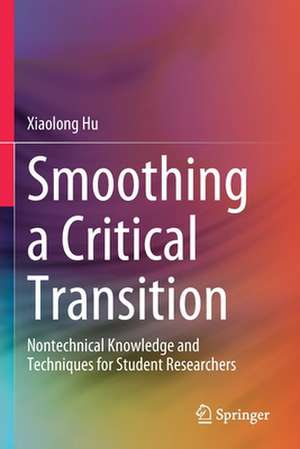Smoothing a Critical Transition: Nontechnical Knowledge and Techniques for Student Researchers
Autor Xiaolong Huen Limba Engleză Paperback – 21 apr 2021
| Toate formatele și edițiile | Preț | Express |
|---|---|---|
| Paperback (1) | 379.86 lei 6-8 săpt. | |
| Springer Nature Singapore – 21 apr 2021 | 379.86 lei 6-8 săpt. | |
| Hardback (1) | 386.99 lei 6-8 săpt. | |
| Springer Nature Singapore – 21 apr 2020 | 386.99 lei 6-8 săpt. |
Preț: 379.86 lei
Nou
Puncte Express: 570
Preț estimativ în valută:
72.69€ • 77.73$ • 60.60£
72.69€ • 77.73$ • 60.60£
Carte tipărită la comandă
Livrare economică 17 aprilie-01 mai
Preluare comenzi: 021 569.72.76
Specificații
ISBN-13: 9789811540370
ISBN-10: 9811540373
Pagini: 137
Ilustrații: XI, 137 p. 76 illus., 28 illus. in color.
Dimensiuni: 155 x 235 mm
Greutate: 0.22 kg
Ediția:1st ed. 2020
Editura: Springer Nature Singapore
Colecția Springer
Locul publicării:Singapore, Singapore
ISBN-10: 9811540373
Pagini: 137
Ilustrații: XI, 137 p. 76 illus., 28 illus. in color.
Dimensiuni: 155 x 235 mm
Greutate: 0.22 kg
Ediția:1st ed. 2020
Editura: Springer Nature Singapore
Colecția Springer
Locul publicării:Singapore, Singapore
Cuprins
Introduction.- Advice to graduate students.- Understand research.- Engage literature.- Writing.- Publish papers.- Present research results.- Interact with advisors.- Collaborate with other researchers.- Work in a laboratory.- File patents.- Handle difficult time in research.- Research ethics and responsibilities.- What can we learn from the history of science.- Concluding remarks.
Notă biografică
Dr. Xiaolong Hu is a Professor at the School of Precision Instrument and Optoelectronic Engineering at Tianjin University, China. He received his B.S. and M.S. from Tsinghua University in 2003 and 2006, respectively, and completed his Ph.D. at the Massachusetts Institute of Technology in 2011. His Ph.D. thesis concerned superconducting nanowire single-photon detectors (SNSPDs) and their applications in quantum optics, and proposed waveguide-integrated SNSPDs. His current research focuses on nanophotonic devices, quantum photonic devices, and nanofabrication. He is also interested in studying the critical transition periods in education. Dr. Hu has authored or coauthored more than 40 papers in international journals and conferences and holds 11 patents. In 2013, he received the OSA Outstanding Reviewer Award, and since 2019, has served as an associate editor of OSA Continuum.
Textul de pe ultima copertă
This textbook equips students interested in becoming researchers with the essential nontechnical skills. After an introduction to graduate schools, it discusses preparing for research, reading and organizing literature, writing research articles and other documents, publishing papers, presenting research findings at conferences, collaboration with advisors and other researchers, patent applications, research ethics, and how to improve research by learning about the history of science. These nontechnical skills are just as important as technical ones in terms of becoming a successful graduate student, yet they have seldom been taught systematically in courses. Further, they can bridge the gap from the classroom to the lab, making one of the most critical transition periods—from student to researcher—smoother and more enjoyable. The book features a wealth of real-life examples and exercises, which readers can easily apply in their own research. Intended mainly for graduate andupper-undergraduate students just embarking on lab research, it can also be used as a textbook or reference guide for courses on research methodology and related topics.
Caracteristici
Covers indispensable research techniques and skills for students, ranging from reading and writing papers, presentation, to collaboration with other researchers and research ethics Highlights selected key concepts, including signal-to-noise ratio, useful redundant information, and being clear and concise, in the context of research-relevant activities Features a wealth of easy-to-understand, real-world examples Intended for a broad readership in various science and engineering disciplines
